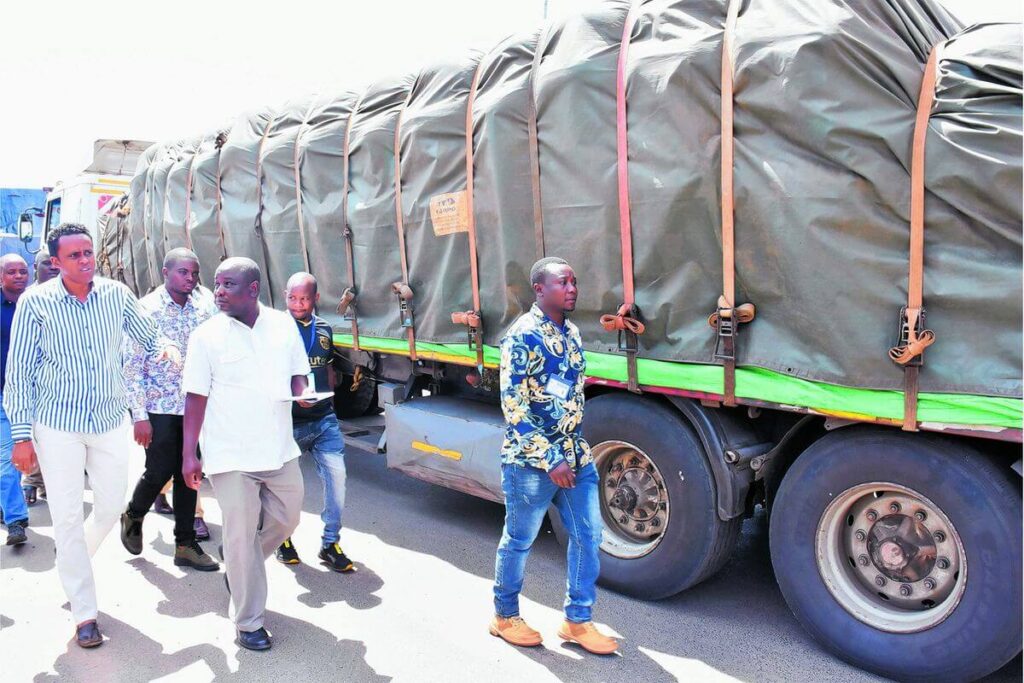Kenya’s imports from neighbouring Tanzania have slumped at the sharpest pace in seven years in a period renewed trade tiffs saw Nairobi bypass Dar es Salaam to buy more from as far as Egypt.
Official trade statistics from Kenya show expenditure on goods trucked from Tanzania in six months through June plunged by nearly a third on the back of restrictions on cereal exports to Kenya.
Tanzania imposed new guidelines on trade in grains between the country and its partners in the East African Community bloc in the review period, rules which largely restricted the importation of maize into Kenya.
Data collated by the Central Bank of Kenya (CBK) indicate the value of Kenya’s goods imports from Tanzania plunged 31.12 percent year-on-year to Sh18.68 billion in the January-June period.
The drop from Sh27.12 billion — a record-high in the half-year period — in a similar period in the prior year was the fastest since 2016.

At the time, imports for the first half of the year had fallen 36.99 percent to Sh6.06 billion at the height of feuds between Nairobi and the administration of former Tanzanian leader John Magufuli (deceased).
The thawing of trade relations between the two biggest economies in the seven-nation EAC bloc during the reign of former President Uhuru Kenyatta and his counterpart Samia Suluhu had pushed Tanzania to become the second-largest source market on the continent after South Africa.
But the sharp drop in the value of imports through the Namanga border has seen Tanzania drop from second to fourth-largest source market for Kenya in Africa having been overtaken by Egypt and Uganda.
The CBK data, sourced from the Kenya Revenue Authority, show imports from Egypt increased 5.21 percent to Sh23.75 billion in the review period, while Uganda’s rose 10.57 percent to Sh18.99 billion.
It was the first time that Kenyan traders spent more on goods from Uganda than Tanzania since the first half of 2019.
Tanzania introduced fresh guidelines on maize imports, which saw more than 200 trucks from Kenya blocked for days at the Namanga and Holili borders, prompting the intervention of President William Ruto.
The measures were part of export restrictions which Dar es Salaam started enforcing from last year to ensure food security in a trading bloc which perennially experiences a deficit in maize, a staple.
The new rules required traders to open and register offices in Dar es Salaam for purposes of getting licences to export maize and other grains as well as tax clearance certificates.
The measures were viewed as contrary to the EAC Common Market Protocol which allows free movement of goods, services, capital and labour within the bloc.
Tanzania’s Deputy Minister for Investment, Industry and Trade Exaud Kigahe told Parliament late June that the measures were helping Tanzania to “fight exploitation that farmers have experienced for years by middlemen and dishonest traders who have been purchasing crops to farmers at low prices.”
Tanzania is a major exporter of maize and rice not only to Kenya but other EAC bloc members such as DR Congo, Burundi and South Sudan.
Data from the Eastern Africa Grain Council show imports from Tanzania nearly grew five-fold last year to 469,474 tonnes from 98,000 tonnes in 2020.
The rules, however, prompted Kenyan maize millers to look for other sources of the staple grain, including Zambia.
Kenya has been experiencing a steady decline in maize production, from 42 million bags in 2020 to 36 million bags in 2021, due to poor rainfall and the high cost of inputs.
According to the Ministry of Agriculture, the national annual maize requirement is 52 million bags, which includes other uses such as the manufacture of livestock feeds, stock retained as seeds and the manufacture of other products.
This comes at a time when the Kenya shilling has lost nearly 20 percent of its value against regional currencies, weakening its dominant position in the region in a trend that is serving pain to traders importing goods from Uganda and Tanzania.
The continued weakening of the Kenyan shilling against the currencies of Uganda, Tanzania and Rwanda means that Kenyan exports into the region are fetching far much less than before.
For instance, goods that used to cost Ugandan traders Sh1 million to import around March 2020 now cost less by about Sh292,000 thanks to the weakened Kenyan shilling.
However, Kenyans buying from Uganda are disadvantaged since they now spend about Sh1.3 million to buy the same quantity of goods that they could get from the landlocked East African country for Sh1 million in March 2020.
Samuel Karanja, the chief executive at Importers and Small Scale Traders Association, told the Business Daily that some of the impacted imports, especially from Uganda, include shoes, clothes, cosmetics and human hair.
“Importing goods in the region is becoming difficult for business. Many of us have had to cut on the volume of goods we are importing or have had to increase money to get the same volume of goods we used to get say a year earlier,” said Mr Karanja in an earlier interview.
Source: Business Daily







